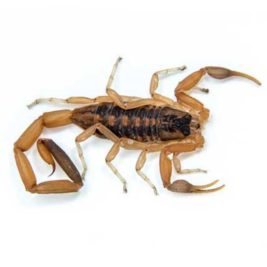Scorpions are very common in the southern United States, as they prefer desert climates. Because they hide in dark, cool areas, they may find the perfect residence in the attic, basement, or crawl spaces inside your home. Seeing a scorpion inside your home is not a pleasant experience, and while most aren’t dangerous, there is one to be wary of in the Las Vegas area. Bark scorpions are the most common and, unfortunately, most venomous type of scorpion in North America. If you spot any type of scorpion in your home, give the experts at Western Exterminator a call to find out how they can be removed safely and effectively.
Identifying a Bark Scorpion in the Home
Because bark scorpions are so common in the Las Vegas area, it may be likely that scorpions found in the home are of this species. They are light brown in color, grow up to 3 inches in length, and have a thin tail with a curved stinger. Bark scorpions are adept climbers, congregate in very large groups, and may be found trapped in sinks or bathtubs, climbing walls, or in a dark closet in the home. Bites are very dangerous to humans and can cause numbness, tingling, blurry vision, and twitching muscles. If you are bitten by a bark spider, it’s crucial to receive immediate medical attention.
What to Do With Scorpions Inside Your Home
No one wants scorpions scampering around in their homes. The thought of them lurking in dark, cool places in your house is enough to call a professional to check out the situation for you. The experts at Western Exterminator can help you learn how to implement some of the following prevention and elimination tips:
- Implement proper exclusion techniques. It’s essential to inspect and seal any holes, cracks, or crevices on the exterior of your property that may let
- Eliminate places scorpions may linger. Placing potted plants on stands, storing outdoor bins away from the home, eliminating yard debris, and making sure your landscaping is tidy can all help keep scorpions away.
- Keep a tidy environment free of food crumbs inside the home to avoid other insects. Because scorpions feed on insects, they may be attracted to homes infested with them.
- Remove sources of standing water and moisture. Make sure your home’s pipes and plumbing works properly without leaks, as scorpions seek out water.
- For scorpions already in the home, lay glue traps, carefully use pesticides, and always take caution in trying to remove them yourself. Scorpions are quick, can be dangerous, and are difficult to get rid of. It’s typically best to simply call a professional exterminator to do the hard work for you.
Professional Scorpion Prevention and Control Services
Bottom line, scorpions are one of the most dreaded pests to find inside your home. While there are certainly methods to remove them yourself and plenty of tips on preventing them in the home, sometimes it’s best to call a professional, especially if you believe the scorpions in your house to be bark scorpions. At Western Exterminator, our expert technicians have the training and experience required to get rid of scorpion infestations and keep them away for good. Give us a call today to learn more about what to do with the scorpions in your home!

 Baby, it’s cold outside! As the temperatures drop below freezing in the
Baby, it’s cold outside! As the temperatures drop below freezing in the